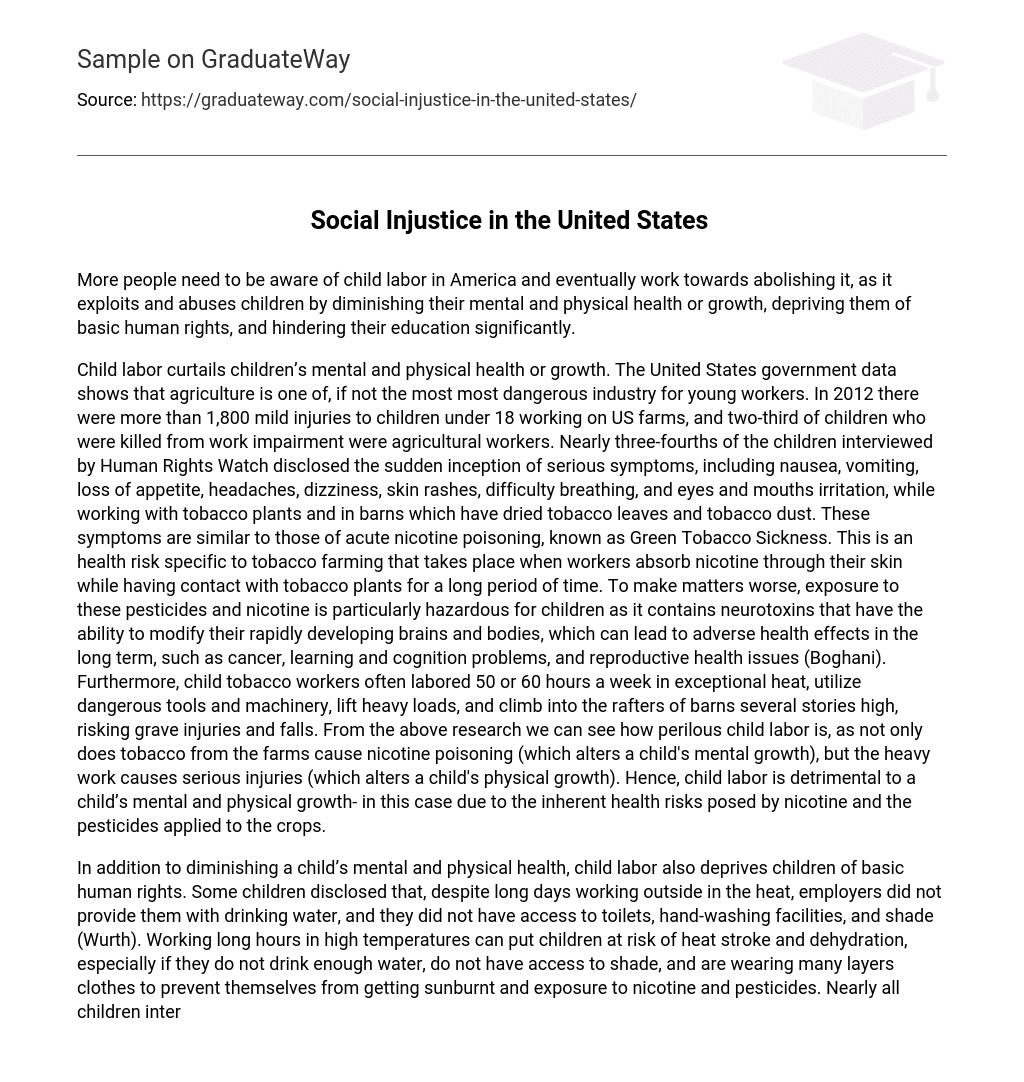More people need to be aware of child labor in America and eventually work towards abolishing it, as it exploits and abuses children by diminishing their mental and physical health or growth, depriving them of basic human rights, and hindering their education significantly.
Child labor curtails children’s mental and physical health or growth. The United States government data shows that agriculture is one of, if not the most most dangerous industry for young workers. In 2012 there were more than 1,800 mild injuries to children under 18 working on US farms, and two-third of children who were killed from work impairment were agricultural workers. Nearly three-fourths of the children interviewed by Human Rights Watch disclosed the sudden inception of serious symptoms, including nausea, vomiting, loss of appetite, headaches, dizziness, skin rashes, difficulty breathing, and eyes and mouths irritation, while working with tobacco plants and in barns which have dried tobacco leaves and tobacco dust. These symptoms are similar to those of acute nicotine poisoning, known as Green Tobacco Sickness. This is an health risk specific to tobacco farming that takes place when workers absorb nicotine through their skin while having contact with tobacco plants for a long period of time. To make matters worse, exposure to these pesticides and nicotine is particularly hazardous for children as it contains neurotoxins that have the ability to modify their rapidly developing brains and bodies, which can lead to adverse health effects in the long term, such as cancer, learning and cognition problems, and reproductive health issues (Boghani). Furthermore, child tobacco workers often labored 50 or 60 hours a week in exceptional heat, utilize dangerous tools and machinery, lift heavy loads, and climb into the rafters of barns several stories high, risking grave injuries and falls. From the above research we can see how perilous child labor is, as not only does tobacco from the farms cause nicotine poisoning (which alters a child’s mental growth), but the heavy work causes serious injuries (which alters a child’s physical growth). Hence, child labor is detrimental to a child’s mental and physical growth- in this case due to the inherent health risks posed by nicotine and the pesticides applied to the crops.
In addition to diminishing a child’s mental and physical health, child labor also deprives children of basic human rights. Some children disclosed that, despite long days working outside in the heat, employers did not provide them with drinking water, and they did not have access to toilets, hand-washing facilities, and shade (Wurth). Working long hours in high temperatures can put children at risk of heat stroke and dehydration, especially if they do not drink enough water, do not have access to shade, and are wearing many layers clothes to prevent themselves from getting sunburnt and exposure to nicotine and pesticides. Nearly all children interviewed by Human Rights Watch said that their employers did not provide health education, safety training, or personal protective equipment to help them reduce their exposure to nicotine from tobacco leaves or pesticides sprinkled on the fields and plants. Children typically used gloves and large black plastic garbage bags, which they bought to wear as protection against wet tobacco leaves and rain (Wurth). This shows the readers, Citizens of America, that the laborers are being treated like slaves. They have no access to fundamental rights like water and a toilet, and do not have the training, protective equipment or health education they require, which causes a numerous amount of accidents and injuries.
Aside from depriving children of basic human rights, child labor hinders their education significantly. A large amount of children who had migrated to the United States for work told Human Rights Watch that they did not join school at all or enrolled in school but missed several months so that they could perform agricultural work, including in tobacco farming. Some children stated that they occasionally missed school to work in times of financial hardship for their families (Wurth). In addition, some children reported working long hours after school that interfered with their ability to keep up with schoolwork. Luciano P moved to the United States at age 11, attended school for several years, but dropped out of school at 15 to work year round in the tobacco farms. He re-enrolled in school at 17, and is now struggling to make up for the missed years (Wurth). Since these children are spending all their days in the tobacco farms, instead of studying and learning, these farms are depriving them of the education they need. This prevents them from growing as an individual as they have little to none knowledge outside of the tobacco field.





